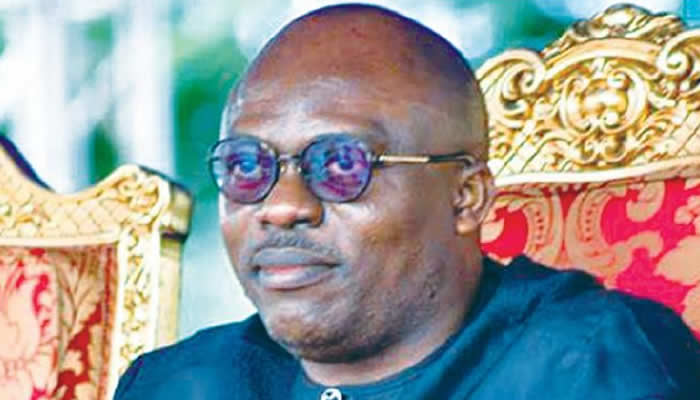Paragraph 1: The Allegations and Initial Reactions
The political landscape of Rivers State was thrown into further turmoil with explosive allegations leveled by Dr. George Nweke, the former Head of Service, against Governor Siminalayi Fubara. Nweke accused Fubara of orchestrating the bombing of the state House of Assembly complex in 2023 to thwart a potential impeachment by lawmakers loyal to FCT Minister Nyesom Wike. He further claimed Fubara was plotting to sabotage oil facilities and incite unrest in various communities, aiming to destabilize the federal government. Nweke’s accusations, delivered at a press briefing in Abuja, sent shockwaves through Rivers State, prompting frantic calls and public discussions as citizens grappled with the implications of these serious claims. The allegations immediately deepened the existing rift between Fubara and Wike, adding another layer of complexity to the ongoing power struggle in the state.
Paragraph 2: Responses from Supporting Factions and Community Leaders
Swiftly following Nweke’s accusations, several groups rallied to Fubara’s defense. The Ijaw National Congress (INC) denounced the allegations as blackmail, suggesting Nweke was coerced into making the statements. The Rivers State Elders and Leaders Council echoed this sentiment, attributing Nweke’s claims to duress and fabrication evident in his demeanor during the press briefing. They dismissed the allegations as an attempt to tarnish the governor’s reputation. Meanwhile, concerned leaders from Nweke’s local government area, Omuma, distanced themselves from the accusations, expressing support for Fubara and characterizing Nweke as a tool of destruction. These varied responses underscored the deeply polarized political climate in Rivers State and the intense loyalty surrounding the key players in this unfolding drama.
Paragraph 3: The Pro-Fubara PDP and the NLC Weigh In
The pro-Fubara faction of the Peoples Democratic Party (PDP) in Rivers State vehemently rejected Nweke’s accusations, labeling them as "lies from the pit of hell." They accused Nweke of acting out a script orchestrated by Wike to undermine Fubara and damage his standing with President Tinubu. They also criticized the Sole Administrator appointed by the President, arguing that the declaration of a state of emergency was unjustified and that the administrator had no real work to do in a state not facing war or natural disaster. Concurrently, the Nigeria Labour Congress (NLC) in Rivers State refuted Nweke’s claims that their leadership had been compromised by Fubara, denouncing the allegations as baseless, misleading, and defamatory. This multifaceted response further highlighted the complex web of political alliances and rivalries at play.
Paragraph 4: Amaechi’s Perspective and Bauchi PDP’s Defense
Former Rivers State Governor Rotimi Amaechi offered a different interpretation of the crisis, attributing the conflict between Fubara and Wike to a dispute over the distribution of funds. He criticized the imposition of emergency rule in Rivers State, deeming it unconstitutional and a denial of democracy. Amaechi’s comments introduced a financial dimension to the conflict, suggesting that the power struggle was rooted in more than just political differences. Meanwhile, the Bauchi State PDP, defending their Governor Bala Mohammed against Nweke’s allegations of involvement, dismissed the claims as mere blackmail aimed at exploiting President Tinubu’s perceived sensitivity to presidential ambitions. This response broadened the scope of the controversy beyond Rivers State, implicating political figures from other regions.
Paragraph 5: Wike’s Camp Responds and the Broader Implications
Lere Olayinka, spokesperson for FCT Minister Nyesom Wike, responded to the pro-Fubara PDP’s defense by simply stating that if Fubara, who allegedly betrayed someone, was now being betrayed in return, they should deal with the consequences. This terse response highlighted the deep-seated animosity between the two factions and the lack of any apparent reconciliation efforts. The ongoing political crisis in Rivers State continued to raise concerns about stability and governance in the region. The allegations of violence, sabotage, and political maneuvering created an atmosphere of uncertainty, potentially impacting the state’s development and the well-being of its citizens.
Paragraph 6: The Unfolding Narrative
The unfolding political drama in Rivers State, marked by accusations, denials, and counter-accusations, paints a picture of intense power struggles and deep-seated rivalries. The allegations against Governor Fubara, if proven true, could have serious consequences for his political career and the stability of the state. However, the strong defenses mounted by his supporters and the counter-claims of blackmail suggest that this complex narrative is far from resolved. The ongoing crisis underscores the fragility of political alliances and the potential for personal ambitions to disrupt governance and create instability. The situation in Rivers State remains volatile, and the long-term consequences of this power struggle are yet to be fully understood.


